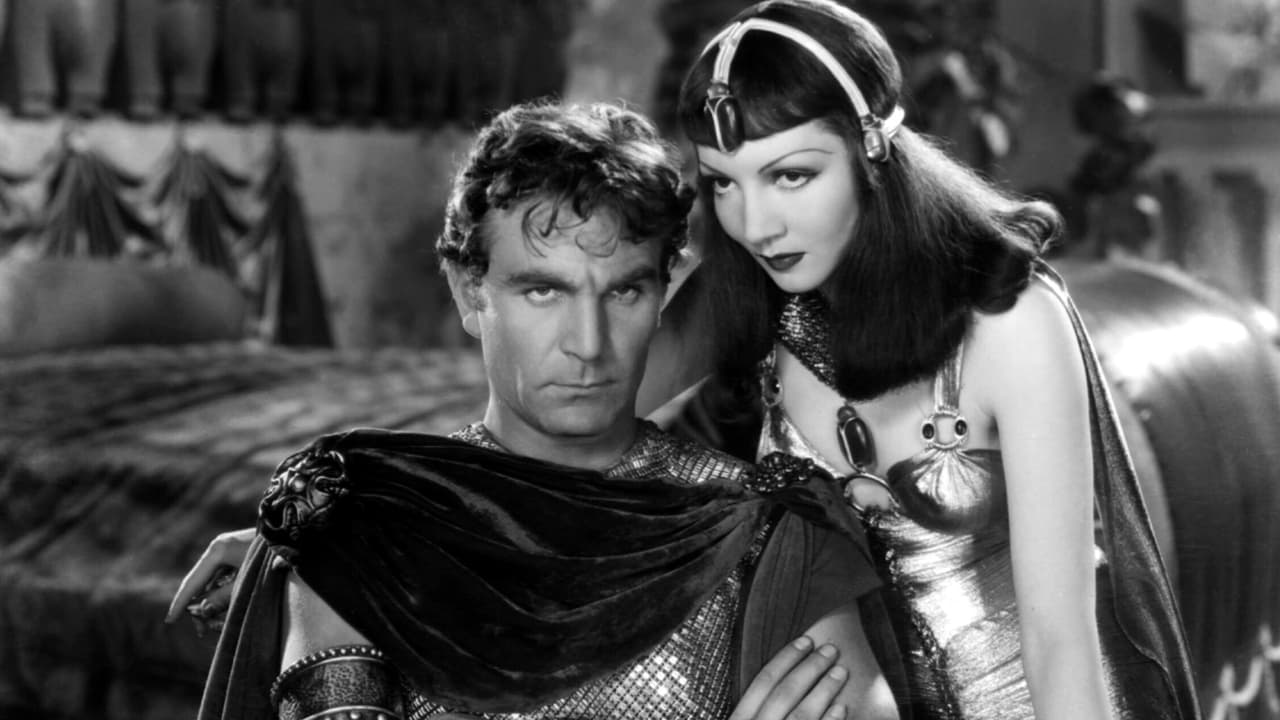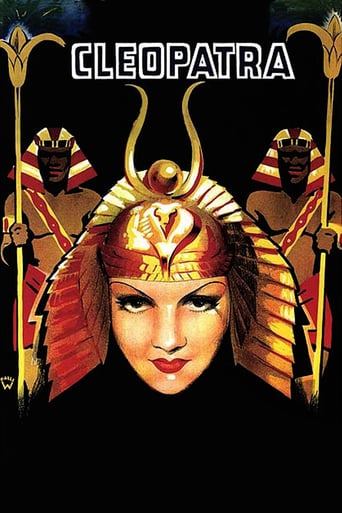



Simple and well acted, it has tension enough to knot the stomach.
View MoreClever and entertaining enough to recommend even to members of the 1%
View MoreI think this is a new genre that they're all sort of working their way through it and haven't got all the kinks worked out yet but it's a genre that works for me.
View MoreClose shines in drama with strong language, adult themes.
View MoreThe cinema told many times Cleopatra's story,all them tried to be magnificent but just a one got it,this version has a great visual treatment,lavish sets,a large numbers of sexy choreograph,Cleapatra's costumes are fantastically design,but this movie suffer when to compare with 1963 version maybe black and white can explain...another thing Colbert vs Taylor have a great distance,the facts isn't accurate,a lack of hieroglyphics in the sets,anyway the movie is good but wasn't convincing in many ways....maybe too short to tell such complex story and events,sounds that it made be rushed,...however a good epic and dated of course.
View MoreA lavish spectacle (perhaps not as famous as the 1963 version) that I'm afraid was a bit of a disappointment when I finally got to see it. It's one of director-producer Cecil B. DeMille's many extravaganzas, which was nominated for a Best Picture Oscar (and 3 others).It does features Claudette Colbert, in the title role and a stunning wardrobe, as well as some incredible sets (though the inside of her "barge" looks a little too much like a studio set, from certain angles) and Academy Award winning Cinematography.But I'm afraid that Warren William's Caesar, and Henry Wilcoxon's Marc Antony leave much to be desired. William didn't seem to make up his mind about how to play Caesar; his performance begins rather woodenly and ends up almost campy. Though Wilcoxon's Antony is "dumb" enough to be manipulated by the Queen of Egypt, I didn't find their passion for one another (nor Caesar's for Cleopatra, for that matter) particularly credible.Ian Keith as Octavian, Joseph Schildkraut as King Herod and C. Aubrey Smith as Caesar's, then Antony's, loyal General provide adequate support. Arthur Hohl and Harry Beresford, who played Titus and Favius (respectively) in the much better DeMille film The Sign of the Cross (1932), play Brutus and the Soothsayer in this one.
View MoreOne of the many problems facing anyone wanting to make an ancient-world epic, is that the times and the people you must depict are so far removed from everything we know today that it is difficult, if not impossible, to produce a picture with any emotional or empathetic weight. Many have tried – the term "intimate epic" is often bandied about when discussing those 50s and 60s behemoths, but I have yet to see one that truly merited the description. But to Cecil B. DeMille, a producer-director who goes with epics like John Ford goes with Westerns, this would be missing the point.The screenplay of Cleopatra is definitely a dramatic one. Aside from the fact that Hollywood was still cash-strapped by the depression, the story is not really suited to impressive action sequences; it is essentially a human love story and such conflict as does take place would be distracting if it was made exciting. The script, by DeMille's current favoured hacks Waldermar Young and Vincent Lawrence, while full of interaction is far from emotionally involving. But even an ace screenwriter would have been hard-pressed to write something that was. How is a modern day audience supposed to relate to a love affair between an emperor and a Queen who lived two thousand years ago? We can't, but we can be entertained by it.In any case, DeMille was not a director who could do deep and moving. Gripping as they often are, even the finest of his contemporary dramas are unlikely to provoke tears or satisfy on an emotional level. Instead, DeMille's pictures stir or dazzle us through their poetic rhythm and imagery. Just like a renaissance painting of some tragic figure, we do not feel the subject's pain, but we can appreciate the beauty with which it is portrayed. This was something that came to the fore in the director's 1930s pictures, when budgets were tight, sets small and extras limited. DeMille was forced to use all his technical abilities to make the images speak.Always a talented choreographer of crowds, and an inventive user of elements within the frame, DeMille here constructs little dances out of camera movement, extras and whatever is on the set to give mood and pace to each scene. One (rightly) well-known instance is at the end of the barge scene, where the camera pulls back smoothly between the rows of oarsmen, adding a bit of romantic atmosphere (not to mention sexual suggestiveness) while, to put it bluntly, Anthony and Cleopatra get it on behind a curtain. But there are other less obvious examples, such as at the party scene where the camera trundles sideways, slaves pottering about in the background, until eventually coming to rest behind a curtain where Caesar's enemies are plotting his downfall. As well as giving a tone to each moment without being intrusive, these manoeuvres keep the picture flowing, and prevent it from becoming a sequence of dull dialogues.And it's just as well Cleopatra is visually engaging, because the acting is pretty mediocre. Warren William is probably the best of the bunch; very theatrical but good in that context. Claudette Colbert is not bad either – she really flourished in these seductive, assertive roles, although she was better yet playing an out-and-out villain – see for example her turn in Sign of the Cross. Henry Wilcoxon on the other hand is as wooden as the set he stands in – I really don't know what he was doing here. but apparently he hit it off with the director and ended up becoming part of the DeMille stock crew as an associate producer. No-one else among the cast stands out as either good or bad.So, back to this problem of ancient-world epics – on an emotional level they are impenetrable to the modern viewer, simply because their setting is just that: ancient. Generally producers of these pictures acknowledged this and instead resorted to impressing us with the stupendous and spectacular. DeMille could easily be pigeonholed as doing the same – certainly that is what his reputation suggests – but in fact he does something even more effective. With his flowing, dreamlike presentation, he actually heightens and envelops his audience in the myth and mystery of a bygone age.
View More113: Cleopatra (1934) - released 10/5/1934, viewed 9/2/08.Russia and Afghanistan join the League of Nations. BIRTHS: Brian Epstein, Sophia Loren, Leonard Cohen, Brigitte Bardot.KEVIN: Cecil B. DeMille is at it again with this lavish sword-and-sandal quickie centering on the romantic life of the legendary Egyptian empress, this time played by Claudette Colbert. It should come as no surprise that this film is very poor history by any measure. Historical events that span decades are compressed into weeks or even days. Seemingly important benchmarks, such as the children that Cleopatra bore with Caesar and Antony, are dropped completely. I guess I was a little surprised at how shallow the movie came out to be. All of the actors are playing caricatures, and all their dialogue is spoken in overblown poetic prose. As this is the second DeMille movie we've seen, some comparing and contrasting is in order. 'Sign of the Cross' was more about the large setpieces than about the actual story. This film, no less lavish or expensive-looking, lets the background stay in the background more than hijacking the story. This time, all the big battles and sexytime bears the Production Code seal of approval. This film has far superior (and Oscar-winning) cinematography from Lubitsch-veteran Victor Milner. While 'Cleopatra' is paced and structured far better than 'Sign of the Cross,' I found the former movie, despite its many flaws and similarly two-dimensional performances, to be much more moving than this one. At no point during this film did I feel anything significant for the characters, except maybe for the first flirting scenes between Antony and Cleopatra, which were the best acted and best staged in the film. And Ian Keith is way too old for Octavian at any point in the story.DOUG: Cecil B. DeMille's take on Cleopatra, once probably the biggest and most definitive version of the story, now looks downright routine by comparison. I have not yet seen the 1964 version with Liz Taylor (I'm kind of waiting until they find all that missing footage). *Contract Player Alert*: Claudette Colbert (eventual Oscar winner for It Happened One Night), for all her awesomeness, never really disappears into the character; she just looks like Claudette Colbert in Cleopatra drag. Maybe it's just that she's the only face I recognized. Still, she looks very good in those costumes, and Cleo comes off (rather intentionally) as the most interesting character, with Caesar, Antony, and Octavian all come off as greedy one-dimensional fools. Also worth noting: the movie opens with a seal of approval from the Production Code of America, the first time we've seen it on the Odyssey so far. It's interesting to compare DeMille's Pre-Code spectacle Sign of the Cross with this one. It's especially noticeable in a montage sequence in the third act which shows the Roman army rampaging through Egypt. Demille's indulgent stretches of violence from Cross are gone, replaced with short, indecipherable clips with occasional stabbing and spearchucking. I hate to say it, but think I liked this one better than Cross. Unable to resort to racy scenes of violence and nudity, DeMille now has to focus on the story, what little of it there is. Recommended? Sure.Last film: The Count of Monte Cristo (1934). Next film: The Merry Widow (1934).
View More